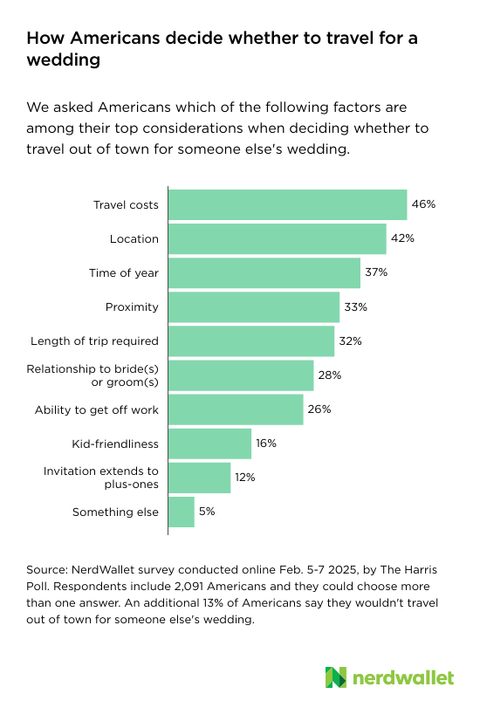Attending a wedding down the street can be costly — purchasing gifts and formalwear, hiring a babysitter and taking off work can all add up. But when the wedding is out of town and requires a flight or hotel stay, it can be downright expensive to celebrate someone else’s nuptials.
Nearly 1 in 10 Americans (9%) are going to a wedding this summer that requires at least one night away from home, according to a new NerdWallet survey, conducted online by The Harris Poll. These wedding guests estimate they’ll spend $1,989, on average, for the associated lodging and transportation costs.
Is traveling for someone else’s wedding worth the cost? That answer depends on your finances and personal priorities.
Deciding whether to travel for other people’s weddings
Most Americans say they’d travel out of town for a wedding (87%), but their top considerations for deciding whether or not to do so vary. Nearly half of Americans (46%) say a top consideration is travel costs, and 42% consider the location of the wedding.

Even if the funds are available and the locale is desirable, work and child care responsibilities could make leaving town for a wedding difficult, if not impossible. You might also just decide it’s not worth spending the time and money to celebrate this particular union in person. But if you want to RSVP “Yes”, here are a few ways to make it more cost-effective.
1. Skip the gift
Some invitations may explicitly say that gifts aren’t expected, some may not. But if you’re already spending money to travel to a wedding, you might choose to forgo the gift. Controversial? Maybe in that subreddit thread you were frantically scrolling. But some wedding and etiquette experts agree that “your presence is the present” at a destination wedding (which, arguably, is any wedding that isn’t local).
This will come down to your comfort with opting out of gift giving and your relationship to the couple. If you know them well enough — likely, if you’re traveling for their wedding — you probably know how they’d react if you just brought a card.
2. Pay for travel with rewards
For those who have points or miles saved up, an out-of-town wedding may be a good time to cash them in for free or reduced airline tickets or hotel rooms. While maybe less appealing than using rewards for a vacation of your choice, points and miles can lose value over time. Because of this, it’s recommended to use them when the opportunity arises.
3. Bunk with friends or family
Staying with loved ones could greatly reduce the financial outlay on wedding lodging costs. This could mean staying at their homes — say, if you’re traveling to your hometown for a wedding — or rooming with them at a hotel and sharing the costs. This may be a tougher proposition if you’re traveling with children, but consider if the savings would be worth the possible inconvenience.
Bonus: Start a wedding savings account
For some, attending weddings may be a rare experience. But for others, particularly younger Americans, this could be the season of life where receiving wedding invitations is commonplace, and the costs are adding up.
According to the survey, 18% of Gen Zers (ages 18-28) are traveling for a wedding this summer, compared to 9% of millennials (ages 29-44), 6% of Gen Xers (ages 45-60) and 5% of baby boomers (ages 61-79). This makes a lot of sense, as Gen Zers (and likely their peers) are at or near statistical marriage age — according to the U.S. Census data, the median age for first marriages is late twenties/early thirties, depending on gender.
For those who attend multiple weddings per year, a wedding guest sinking fund is probably a good idea. Consider opening a savings account or subsavings account specifically earmarked for attending other people’s weddings and put money in it regularly. This could help take the stress away when the next save-the-date hits your mailbox.
The complete survey methodology is available in the original article, published at NerdWallet.
The article Wedding Guest Travel: Minimizing Costs to Make it Work originally appeared on NerdWallet.